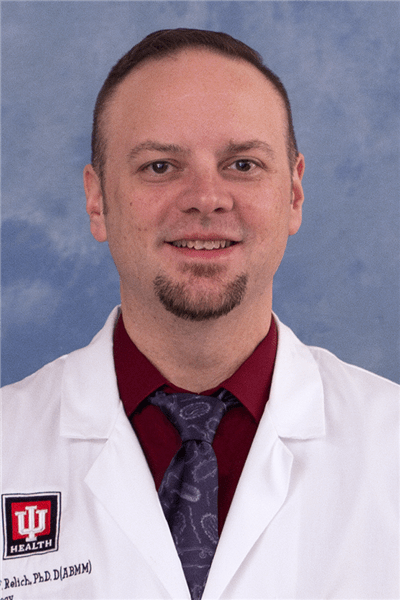
Ryan F. Relich, PhD
Professor of Clinical Pathology & Laboratory Medicine
Medical Director, IU Health Division of Clinical Microbiology
Medical Director, IU Health Donor Screening Laboratory
Medical Director, IU Health Special Pathogens Unit Laboratory
Associate Medical Director, IU Health Division of Molecular Pathology
Director, IU School of Medicine CPEP-Accredited Medical and Public Health Laboratory Microbiology Fellowship Program
Bio
Dr. Ryan F. Relich is an American Board of Medical Microbiology-certified medical microbiologist who is passionately interested in all facets of diagnostic microbiology, especially laboratory directorship, infectious disease epidemiology and pathology, new diagnostic test development and evaluation, pathogen discovery, and viral ecology. At the Indiana University School of Medicine, he is actively involved in fellow, resident, and student teaching, and is the Director of the IU School of Medicine's CPEP-accredited Medical and Public Health Laboratory Microbiology Fellowship Program. He is actively involved in research concerning in vitro diagnostic product development, clinical trials, and emerging virus ecology. As an employee of Indiana University Health, Dr. Relich serves as the Medical Director of the Division of Clinical Microbiology, Medical Director of the Special Pathogens Unit Laboratory, and Interim Medical Director of the Division of Molecular Pathology. Dr. Relich is immensely interested in the ecology of emerging viruses, pandemic preparedness, development of dignostics for novel viruses, virus discovery and characterization, and establishing best practices for manipulating highly infectious clinical specimens for routine diagnostic testing. For more information on Dr. Relich's research interests, please click on the "Research" tab below.
Key Publications
- Doseeva V, Mostafa HH, Rhoads D, Relich RF, Garner O, Findeisen P, Eigner U, English A, Johnson S. 2025. Performance evaluation of the NeuMoDx EBV Quant Assay 2.0 in comparison with cobas EBV for Epstein-Barr virus DNA quantification in immunocompromised patients, a multicenter study. Diagn Microbiol Infect Dis. 113(3):116956. PMID: 40578123.
- Ochwoto M, Kuhn S, Schaughency P, Greene B, hawes K, Koukouikila-Koussounda F, Elenga RG, Boussam DAE, Mayangue PI, Schulz J, Martens C, Niama FR, Lack J, Relich RF, Munster VJ, Yinda CK. 2025. Development and validation of a new mpox virus sequencing and bioinformatic analysis pipeline. Emerging Microbes Infect. 14(1):2494733. PMID: 40232684.
- Relich RF, St George K, Mostafa HH, Graf EH; Association for Molecular Pathology Infectious Disease Subdivision Leadership. 2025. Developments in infectious disease molecular diagnostics and the impact on health care. J Mol Diagn. 27(2):97-99. PMID: 39880581.
- Shaheen M, Lei GS, Relich RF, Gonzalez IA. 2024. Clinicopathologic characterization of invasive fungal intestinal infections in pediatric patients. Pediatr Dev Pathol. 27(6):545-551. PMID: 39215520.
- Chaleff A, Gang A, Relich RF, Lavik JP. 2024. Utilizing confocal microscopy and topical natamycin in Metarhizium keratitis of Caribbean origin. Diagn Microbiol Infect Dis. 110(1):116369. PMID: 38909427.
- Franco LC, Ahmed M, Kendra CG, Sperling RM, Van Benten K, Lavik J-P, Emery CL, Relich RF, Gavina K. 2024. Validation of a qualitative real-time PCR assay for the detection of Candida auris in hospital inpatient screening. J Clin Microbiol. 62(6):e0015824. PMID: 38690882.
- Dbeibo L, Beeler C, Clark L, Zondor M, Sartino C, Relich RF, Hazen D, Lyons K, Kelley K, Webb D, Saysana M, Kara A. 2024. Candida auris outbreak at a tertiary care hospital during the COVID-19 pandemic. Am J Infect Control. 52(8):878-883. PMID: 38537678.
- Relich RF, Van Benten K, Lei G-S, Robinson CM, Carozza M, Sahoo MK, Huang C, Solis D, Sibai M, Myers CA, Sikorski C, Balagot C, Yang D, Pinsky BA, Loeffelholz MJ. 2024. Determination of the cycle threshold value of the Xpert Xpress SARS-CoV-2/Flu/RSV test that corresponds to the presence of infectious SARS-CoV-2 in anterior nasal swabs. Microbiol Spectr. 12(4):e0390823.
- Gavina K, Franco CL, Khan H, Lavik JP, Relich RF. 2023. Molecular point-of-care devices for the diagnosis of infectious diseases in resource-limited settings - A review of the current landscape, technical challenges, and clinical impact. J Clin Virol. 169:105613.
- Saunders JL, Daniels IA, Edwards TL, Relich RF, Zhao Y, Smith LA, Gaston BM, Davis MD. 2023. Effects of pH alteration on respiratory syncytial virus in human airway epithelial cells. ERJ Open Res. 9(4):00404-2022. PMID: 37465558.
| Year | Degree | Institution |
|---|---|---|
| 2015 | Fellowship | IU School of Medicine |
| 2011 | PhD | Miami University |
| 2004 | BS | Clarion University of Pennsylvania |
Dr. Relich is very interested in the diagnosis of infectious diseases, especially viral diseases, and implementation of new diagnostic methods such as matrix-assisted laser desorption-ionization time-of-flight mass spectrometry (MALDI-TOF MS), real-time polymerase chain reaction, and next-generation sequencing for the identification of pathogens. In addition, he is interested in classical virological methods, such as cultivation, serology, and electron microscopy, for detection of viruses in clinical specimens.
Desc: Trustees Teaching Award
Scope: University
Date: 2023-05-02
Desc: Young Investigator Award
Scope: International
Date: 2021-05-01
Desc: Clinical Pathology Teaching Award
Scope: Department
Date: 2018-06-15
